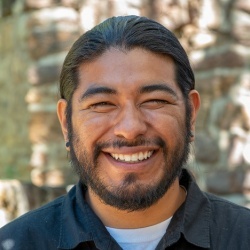I felt disoriented. I was just speaking with someone from Ilom who was telling me how many women and children had migrated within the past year, how others were recently deported and how many still planned to go. Nowhere will you see so many injustices as in the Ixil Region, which proves that Guatemala is not capable or qualified to be a safe third country.
It’s a three-hour bus trip on a muddy and bumpy dirt road from the town center of Chajul to Ilom. Pretty soon after halfway, you see the construction of the Xacbal Delta dam and the fully operational Hidro Xacbal dam. Both are located on the finca (plantation) La Perla, a land stolen from the Ixil in the early 20th century, today owned by the Arenas Menes brothers. Their father was known as Tigre del Ixcán (Tiger of Ixcan) due to his brutality and his harsh treatment of workers. The dams are owned by the Honduran Grupo Terra conglomerate, owned by Fredy Nasser, who supported the 2009 coup against President Manuel Zelaya. Both of these dams will generate approximately 169 MW combined and make millions of dollars in profits that will not benefit local communities. Despite the presence of these dams, a resident of the finca La Perla told me there is no electricity where they live and that the finca owner requested electricity only be made available to his residency and administration office, but not to residents. Moreover, residents are not permitted to fix up their adobe or wooden houses. So, if anyone wants to put up a block house, they risk getting kicked out of the finca. In other words, they are condemned to live in substandard housing conditions. Ilom and La Perla are symbolic of the neocolonial realities that exist in Guatemala, where foreign corporations, large landowners and the extraction and looting of natural resources take precedence over the well-being of people.
[frasepzp1]
There are a lot of reasons people flee from Guatemala, such as poverty, state-sponsored violence, climate change, search for better opportunities and family reunification, among others. Historical displacement and the lack of land has also created conditions for people to migrate. In discussing buying land for his children, an elder and ancestral authority in Ilom said: “If I go north, there’s a finca. If I go south, there’s a finca. If I go west, there’s a finca. If I go east, there’s a finca. I have nowhere to go!” There’s a sense of not being able neither to breathe nor to grow for both crops and new families. Some migrants who make it to the US send remittances back to build up their houses and purchase land. To best combat migration, we don’t need harsh immigration laws that criminalize migrants and asylum seekers. Rather, we need serious discussion on initiatives that tackle the historical and structural inequalities in Guatemala which have caused centuries of territorial dispossession, particularly for indigenous communities. These include, but are not limited to, agrarian reform, redistribution of wealth and the end of destructive extractivist industries such as mining and dams, as well as cultivation of mega-crops like African palm, which has caused environmental degradation, militarization and social divisions.
In Guatemala there are high rates of homicide, femicide, persecution of community leaders and corruption. Many of these crimes go unresolved due to impunity, which benefits the perpetrators of violence. The illegal agreement is disrespectful and harmful to the Guatemalan people, who migrate on a daily basis, some dying on the way to the US. Many sectors of society such as indigenous communities, students and human rights organizations have denounced the agreement since Guatemala is not a safe place to live. The elites and the Morales administration are treating this country as their finca, and gringos as its owners. The safe third country agreement needs to be eliminated immediately.
* * *
Read it in Spanish here.




























Más de este autor